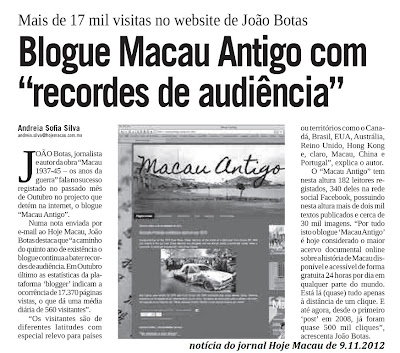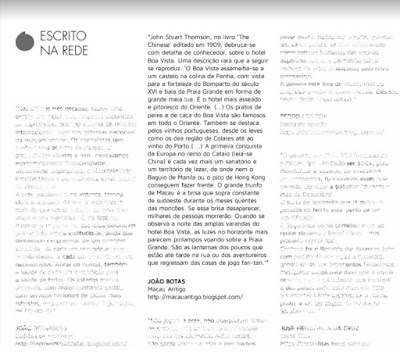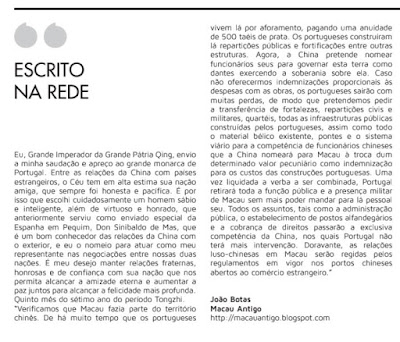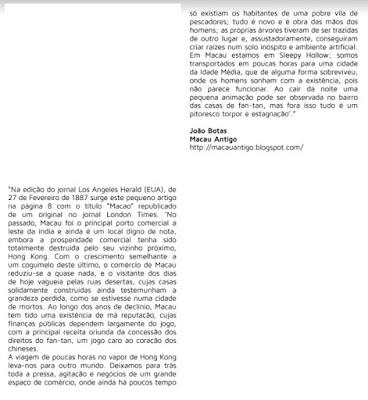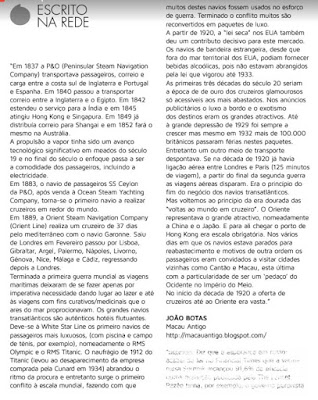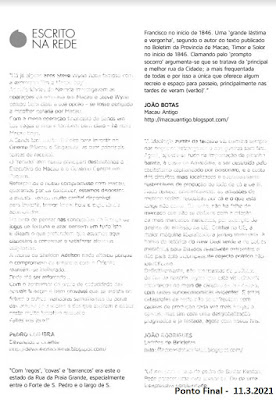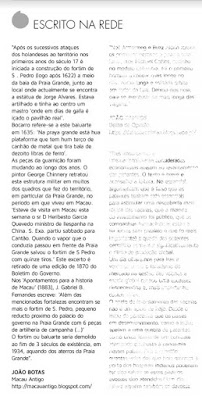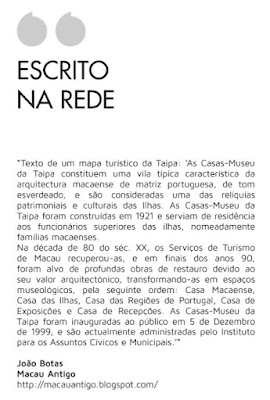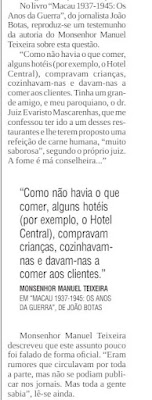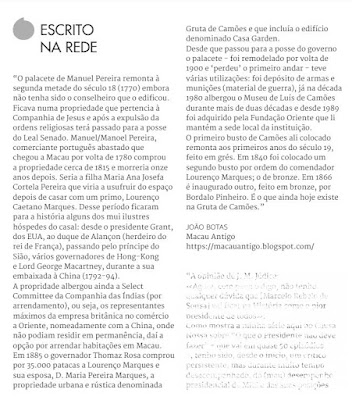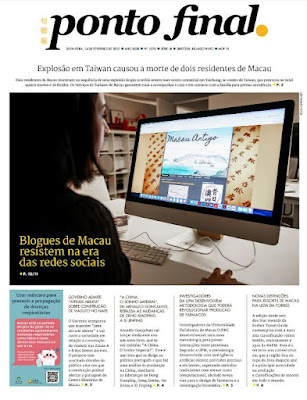JTM - 27.7.2009
Hoje Macau - 28.7.2009
JTM - 31.7.2009
Programa rádio "Agora Acontece" - 29 Março a 4 Abril 2010: exibido em 90 rádios, incluindo Portugal e Macau
JTM - 3.3.2010
Va Kio, Ou Mun, Cheng Pou e San Wa Ou (jornais de língua chinesa) - Fev. 2011
TSF - 2011
TSF - 2011
Hoje Macau - 23.3.2012
Hoje Macau - 2.4.2012
JTM - 19.4.2012
Hoje Macau - 19.4.2012
Macau Daily Times - 2.5.2012
Agência Lusa - 14.5.2012
JTM - 15.5.2012
Ponto Final - 15.5.2012
JTM - 21.5.2012
JTM - 19.6.2012
Hoje Macau - 27.6.2012
Rádio Macau - entrevista 17 Junho 2012 - Programa Paralelo 22
Ponto Final - 11.7.2012
Hoje Macau - 19.7.2012
Hoje Macau - 17.9.2012
Hoje Macau - 9.11.2012
Hoje Macau - 31.12.2012
Hoje Macau - 02.01.2013
Ponto Final - 23.01.2013
Hoje Macau - 25.01.2013
JTM - 25.2.2013
Ponto Final - 23.01.2013
Hoje Macau - 25.01.2013
JTM - 25.2.2013
Ponto Final - 20.3.2013
Ponto Final - 27.3.2013
Hoje Macau - 28.3.2013
Ponto Final - 2.4.2013
Hoje Macau - 2.4.2013
Ponto Final - 3.4.2013
Palestra e sessão de autógrafos no IIM a 3.4.2013
JTM - 3.4.2013
Macau Daily Times - 5.4.2013
JTM - 5.4.2013
TDM TV (programa Montra do Lilau) - 10.4.2013
RTP Internacional - Programa Macau Contato 2013
TDM Rádio (programa Rua das Mariazinhas) - 10.4.2013
Revista Macau (edição online) - 11.4.2013
JTM - 11.4.2013
O Clarim - 13.4.2013
JTM - 7.5.2013
10.5.2013 - O projecto Macau Antigo foi convidado para uma apresentação do projecto no âmbito da Conferência Internacional "Macau Narratives"
JTM - 21.5.2013
Ponto Final - 29.5.2013
Ponto Final - 6.9.2013
JTM - 18.9.2013
JTM - 19.9.2013
RFM - 31.10.2013
JTM - 1.11.2013
JTM - 5.11.2013
HM - 5.11.2013
7.11.2013 - Entrevista Rádio Internacional da China/Rádio íris (Portugal)
JTM - 27.11.2013
Hoje Macau - 28.11.2013
Ponto Final - 17.02.2014
04.03.2014
"Sobre Macau no período da “Guerra do Pacífico”, bem longe de tudo estar dito, quase tudo continua por dizer. Para além de um primeiro livro dado ao prelo há menos de dois anos, que se pode considerar ter abordado a questão em profundidade, escrito pelo jornalista João Botas, o panorama bibliográfico nessa matéria resume-se a uma ou duas monografias, um livro de memórias, artigos de jornal avulsos e pouco mais."
João Guedes in "Ponto Final", 02.05.2014
JTM 14.05.2014
Muito esquematicamente, poderemos fixar a genealogia da sinologia portuguesa em quatro linhas de força, que ganharam vida a partir desse microcosmos que é Macau, com estéticas, hermenêuticas, ideologias e filosofias interdependentes, mantendo em comum apenas o modus cogitandi típico dos valores cosmopolitas da latinidade. O peso da linha histórico-cultural, quiçá excessivo, resulta essencialmente da fragilidade da linha erudita. A produção intelectual destes autores corresponde ao corpus maior da sinologia portuguesa:
a) Linha clássica: Bento de Góis, António de Gouveia, João de Barros, Álvaro Semedo, Gabriel de Magalhães, Gaspar da Cruz, Galiote Pereira, Fernão Mendes Pinto;
b) Linha histórico-cultural: José Miranda e Lima, Leôncio Ferreira, Bento da França, Francisco Rondina, José Gomes da Silva, Lourenço Marques, João Feliciano Marques Pereira, Manuel da Silva Mendes, Morais Palha, João Paulino Castro, Abílio Basto, José da Costa Nunes, Ferreira de Castro, Jack Braga, Manuel Teixeira, Benjamim Videira Pires, Almerindo Lessa, Leonel Barros, José Silveira Machado, Francisco Carvalho e Rego, Arquimínio Costa, Ana Costa Lopes, Celina Veiga de Oliveira, Graciete Batalha, Beatriz Basto da Silva, António Carmo, Jorge Rangel, Ana Maria Amaro, João de Deus Ramos, Cecília Jorge, Rogério Coelho, José Rocha Dinis, António Caeiro, João Guedes, Carlos Morais José, Hélder Fernando, Rogério Puga, Daniel Pires, Luís Sá Cunha, Carlos Marreiros, António Conceição Júnior e João Botas;
c) Linha erudita: Joaquim Afonso Gonçalves, Pedro Nolasco da Silva, José Vicente Jorge, Luís Gonzaga Gomes, Joaquim Guerra, Daniel Carlier, António Graça de Abreu e Ana Cristina Alves;
d) Linha literária: Camilo Pessanha, António Patrício, Wenceslau de Moraes, António Patrício, Maria Anna Tamagnini, Deolinda da Conceição, José Joaquim Monteiro, José Santos Ferreira, Henrique de Senna Fernandes, Maria Ondina Braga, António Manuel Couto Viana, Fernanda Dias, Alberto Estima de Oliveira e Rodrigo Leal de Carvalho.
António Aresta in “Portugal-China: 500 anos”, co-edição da Biblioteca Nacional de Portugal/Babel, Lisboa, 2014
Hoje Macau - 21.05.2014
Programa "Terra a Terra" (rádio TSF) - 31.05.2014 (Feira do Livro de Lisboa)
Ponto Final - 24.09.2014
Jornal Tribuna de Macau - 08.10.2014
Ponto Final - 14.11.2014
Ponto Final - 8.4.2015
Ponto Final - 14.4.2015
Ponto Final - 27.4.2015
SIC e SIC Notícias - 27.4.2015
Edição da Manhã (aos 3'58") - As Escolhas Online de... Patrícia Mouzinho
Ponto Final - 5.5.2015
Ponto Final - 11.5.2015
Agência Lusa - 14.5.2015
Hoje Macau - 15.5.2015
Ponto Final - 15.5.2015
Ponto Final - 28.5.2015
Ponto Final - 4.3.2016
Vitor Teixeira, in Revista Cultura, Edição Internacional nº 50
Blogue é um "excelente repositório de informações sobre
Macau"
(...)Há instituições ligadas a
Macau [Casa de Macau, Fundação
da Casa de Macau,
Fundação Jorge Álvares, Fundação
Oriente, Centro Científico
e Cultural de Macau]
que continuam a fazer o seu
caminho, que é o de criarem
pontes de entendimento entre
as margens.
Em Macau, o Instituto Internacional
de Macau, a Escola
Portuguesa de Macau e os
órgãos de comunicação social
de língua portuguesa [Jornal
Tribuna de Macau, Jornal
Hoje Macau, Jornal Ponto Final,
Jornal O Clarim, a Revista
de Cultura, a Revista Administração,
a Revista Macau,
a secção portuguesa da Rádio
Macau e a secção portuguesa
da Televisão de Macau], sem
esquecer a blogosfera [por
exemplo, os blogues “Macau
Antigo”, de João Botas e
as “Crónicas Macaenses”, de
Rogério Luz] mantêm vivo o
legado civilizacional latino e
português com uma exemplar
Doze livros
para pensar Macau
convivialidade, onde a Igreja
Católica em torno da Diocese
de Macau tem uma presença e
uma acção tão notável quanto
insubstituível. (...)
António Aresta in JTM 11.5.2016
Junho 2016
in JTM 13.10.2016
Entrevista na TDM Rádio Macau com Jorge Vale: 1.12.2016
in Ponto Final 1.12.2016
Macau na Segunda Guerra Mundial: Território de contrastes entre o bloqueio económico
João Botas, um dos autores que contribuíram para o livro “Wartime Macau”, explicou ontem ao PONTO FINAL como o território foi afectado pela Guerra. Apesar da pobreza e das privações, os soldados japoneses utilizavam a cidade como destino turístico, revela o investigador e jornalista.
 Um território entre bloqueios, cuja economia foi severamente afectada, não só pela falta de acesso a produtos alimentares básicos mas também pelo grande fluxo de refugiados que a ele aportaram. É desta forma que João Botas, um dos colaboradores do livro Wartime Macau, coordenado por Geoffrey C. Gunn, define a economia do Território durante a Segunda Guerra Mundial.
Um território entre bloqueios, cuja economia foi severamente afectada, não só pela falta de acesso a produtos alimentares básicos mas também pelo grande fluxo de refugiados que a ele aportaram. É desta forma que João Botas, um dos colaboradores do livro Wartime Macau, coordenado por Geoffrey C. Gunn, define a economia do Território durante a Segunda Guerra Mundial.
“Estamos a falar de um período de guerra em que as necessidades são prementes. Temos de equacionar que em Macau – e apesar de não ter havido invasão japonesa – havia efectivamente um bloqueio naval, por um lado, e um terrestre, por outro, porque os japoneses estavam nos dois lados” disse ontem Geoffrey C. Gunn, ao PONTO FINAL.
“Este bloqueio criou sérias dificuldades, nomeadamente pelo facto de ter deixado de haver mantimentos de um momento para o outro. Também no espaço de dois ou três anos a população mais do que triplicou, passando de cerca de 200 mil pessoas para mais de 600 mil habitantes. Isso criou dificuldades”, acrescentou.
Para conseguir contornar estes bloqueios, o Governador de Macau na altura, Gabriel Maurício Teixeira, chamou a si um papel fundamental, explica Botas: “Ele teve que usar a diplomacia e fazer uso da inteligência para conseguir contornar esse bloqueio que aqui e ali era desbloqueado, com o consentimento japonês, através da troca de favores, que permitiam que um navio fosse buscar arroz ao Vietname ou a Timor”.
Nessa altura havia ainda realidades distintas para as diferente pessoas entravam em Macau. Isto porque a cidade que hoje trabalha para ser um Centro Mundial de Turismo e Lazer já na altura era vista como um local para férias para os oficiais japoneses: “Os japoneses utilizaram Macau como um campo de férias e quando vinha para aqui, passeavam-se e havia um sentimento de lazer. Frequentavam o casino do Hotel Central e comiam e bebiam muito porque para eles não havia privações”, conta João Botas.
Por outro lado, as classes mais pobres atravessam um período dos mais complicados, que o autor não tem dúvidas em apelidar como um dos “mais negros” da História de Macau: “Foi um período muito negro, para não dizer que foi o período mais negro da história de Macau. Conta-se nessa altura – e isto está provado por diferentes fontes – que quando os oficiais japoneses já bêbedos saíam dos jantares e vomitavam na rua, que os mendigos aproveitavam para comer o que não tinha sido digerido”, conta o jornalista.
Esta sexta-feira os autores do livro, Geoffrey C. Gunn, João Botas, Roy Eric Xavier e Stuart Braga, vão estar na Livraria Portuguesa, pelas 18h30, para abordar um trabalho que foca Macau durante a Segunda Guerra Mundial em diferentes vertentes.
Artigo de João Santos Filipe
in Ponto Final: 2.12.2016
Excertos do artigo de 2.12.2016 "Os dias do Caos" relativo aos 50º aniversário do "Motim do 1,2,3" publicado no jornal Hoje Macau
in JTM 2.12.2016
in Hoje Macau: 6.12.2016
History – João Botas | ‘Old Macau’ blogger to publish Mendes biography with or without sponsors
By Daniel Beitler
Portuguese journalist and avid Internet blogger, João Botas, is planning to publish a biography next year about celebrated Macau polymath, Manuel da Silva Mendes. His search for sponsorship from organizations in Macau is proving problematic, he said in an interview with the Times last month.
The book, which has come about due to one interested reader reaching out to Botas, will detail Silva Mendes’s life with a particular focus on his years spent in Macau between 1901 and 1931.“My new book will be published early next year [2017], around March,” he told the Times in a recent interview. “It’s about a [man] called Manuel da Silva Mendes, who was a teacher and a lawyer and he became one of the most knowledgeable Portuguese about Chinese culture and philosophy, writing hundreds of articles about China’s civilization.”
The Portuguese journalist was in Macau recently to make a presentation at the Macau Portuguese School and to attend the ninth edition of the Gathering of the Macanese Communities. Botas says that he is not strictly Macanese, as he disputes the traditional mixed heritage definition. He appreciates the connection the community offers, but personally opts for a more modern, cultural classification.
He also insisted on multiple occasions throughout his interview with the Times that he is not an historian. He told the Times that the time-consuming activities of writing and managing almost daily entries on his online blog, “Macau Antigo,” as well as his full-time profession in journalism keep him more than busy.
“I am not historian; I am a journalist,” Botas was keen to stress, “I employ techniques on behalf of history, with the aim of telling the story for the average person who buys a newspaper.” He added that the consequence of not being a professional historian means that his approach is “amateurish.”
In at least one sense however, Botas and the historical figure of Mendes have this in common. Mendes is famously regarded as a lawyer, politician and scholar – but not a writer – though the many disciplines in which he dabbled no doubt refined his writing ability and assisted in his study of sinology, for which he is most often remembered today.
Botas’s clear affinity for the polymath is reflected in their similar approach to dabbling in vocations while refraining from regarding themselves as true professionals. “[Mendes] was writing throughout that period but did not regard himself as a writer,” the journalist emphasized.
Not everyone appreciates Botas’s ‘casual’ approach to the subject and his work is sometimes criticized by professionals.“I think that the [history] academics… have a problem with us amateurs,” Botas told the Times during his interview, “Because they think that we are too amateur. But they can’t reach as many people as we can. So if there is a problem, it’s not with us [journalists], it’s with the academics.”
“It is one thing to do academic research – there is no problem with that. The problem is when they try to sabotage my work by saying that they are better than [journalists, purely] because they are academics,” he continued.
In researching and writing about Mendes, Botas has sought sponsorship to finance the venture. Naturally, he started searching within Mendes’ patron city, Macau, which hosted the polymath until his death in 1931.
“For the book I started to search for sponsors years ago. […] I knew that, with or without support, the book would be completed, because in 2017 it will be the 150th anniversary [of his birth], as he was born in 1867,” said Botas, adding that it has been previously incorrectly published as 1876 in the Macau Art Museum.
Though the search for sponsors started years ago, Botas said that it has not exactly been fruitful. He said that he applied for funding from the Macao Foundation and though
the organization offered some support for the upcoming book, its monetary contribution was small and came with strings attached.
the organization offered some support for the upcoming book, its monetary contribution was small and came with strings attached.
“[The Macao Foundation] sent me a long letter saying that they were honored to present me with MOP5000… which is kind of interesting to say the least,” said Botas, “and I said to them: ‘The idea is for you to support me, and not for me to support you.’ In exchange for this I would need to provide 50 copies of the book and send them [to Macau] from Portugal. The MOP5000 would not be enough to pay for the books [to be produced and shipped],” he said, visibly dismayed.
Asked why the Macao Foundation had made this offer with the attached proviso, Botas was unsure. “I don’t know. Maybe it’s negligence – because I don’t believe they are stupid. Or maybe they just don’t know what they are doing. […] It’s not insulting… but I don’t think they respect me,” he said.
The Macao Foundation was unable to confirm the alleged offer as, according to a representative of the organization, they do not discuss negotiations with anyone other than the applicant in question.
The representative said that usually funding for books about Macau “is [to be used] for the printing and publication costs, which can include editing and translating,” rather than funding the authors themselves for the project.
Meanwhile, the Portuguese journalist is “philosophically opposed” to seeking sponsorship from the casinos. Unwilling to delve too deep into the cause behind his reluctance, Botas said only that he believes the casino operators owe much more to Macau than the financial contribution they make to the government.
He remains however, undeterred and said he will publish the book with or without sponsorship because he has a passionate interest in the history of Macau.
“Macau is unique. You can’t find these circumstances anywhere else,” he said. “You can’t find something even similar to Macau anywhere, throughout history. […] Beside a few problems here and there, 1932 and 1966 and so on, to find a place with this kind of success is impossible. That’s why it’s amazing. You can start digging and you will find many, many things.”

One million Milestone
João Botas’s online blog, “Macau Antigo”, which began in earnest about eight years ago, recorded its one-millionth view in September this year, according to data provided by Google Analytics.
Most of his readers are from the Macanese diaspora community living abroad, including in Australia, Brazil, Canada and the U.S.. But there are also non-Macanese readers (Botas supposes) based in Macau and Portugal.
Botas, who regards the occasion as a milestone, recalled the blog’s early beginnings as far back as 2005, years before it went live.
“Around 2005 I started to do some research – just for me, not for anyone else – just to know more about this place,” said Botas, “My idea was to gather the documents that I find and make a project from them, [which I would] put on the Internet.”
It was a learning process, he said, and in the beginning his blog entries were sometimes too long or too short. He also didn’t know which subjects his readers were interested in. “It took some time to get it right,” explained Botas.
“The biggest question about the blog was: ‘Where do I start, and where do I finish? Which [period] of Macau’s history?’ The decision for me was to start at the beginning of Macau, before the Portuguese arrived,” he said, “There was a Macau before the Portuguese! Small villages and few people, but a history [nonetheless]!”
WHAT DO YOU REALLY KNOW ABOUT MACAU? – Exclusive Interview With Joâo F. O. Botas
Aurelio Porfiri
Aurelio Porfiri
Macau has a fascinating past, full of stories and events that link in a very peculiar way the Empire of China with the civilization coming from the West. This meeting was not always easy, indeed it was often difficult and, somehow, with issues that are still unsolved. But certainly a place like Macau deserves to be thoroughly investigated from an historic point of view. To be sure, several historians from Portugal, China, Europe, United States have tried their best to shed light on this or that aspect of the important history of this city.
Among the people investigating the past of the city, one should mention João F. O. Botas. He was born in Portugal in 1971 but has lived during the 80s in Macau, where he graduated from the Macau Lyceum (to whom he will dedicate a book) and started his first experiences as journalist, notably in Macau’s TDM. He is now a journalist for RTP (Rádio e Televisão do Portugal). He has devoted several studies to Macau and published some books about it, as the ones about the history of Macau Lyceum and about the situation of Macau during WWII. He is the editor of a very interesting blog about Macau called Macau Antigo, a blog that has had more than a million views.
Why you have become interested in the history of Macau?
I lived in Macau when I was very young… I finished high school there, at Liceu, and I was very lucky to have very good teachers such as Beatriz Basto da Silva in History class. That’s when it all begun, when I became interested in Macau’s history. Some years later, after finishing my upper course (Social Communication/Journalist), in Portugal, I felt, that most people didn’t really know how rich Macau history is. So I thought, I have to do something about this…
Why did you feel it important to study and publish a book about the Liceu de Macau?
Liceu was the place where I spent my youth. I lived in Macau around 10 years. That’s where I matured, where I made friends for life. I used to say, every time I visit Macau, that I feel at home. And it’s true! It all started, around 2005, with a question about the old building of Liceu at Praia Grande (where Bank of China now stands, that quarter in front of hotel Sintra): who was the architect who did that? Liceu had a very, very long life. It started in 1893 and finished in 1999. So many stories to tell…
Can you present briefly some of the most important people teaching and studying there?
Many generations of teachers and students are linked to Liceu. Some of them are very well known, such as Wenceslau de Moraes, Camilo Pessanha, Manuel da Silva Mendes, Monsignor Manuel Teixeira, Lara Reis, Carlos Assumpção, Henrique de Senna Fernandes, José dos Santos Ferreira, Luís Gonzaga Gomes, and many others… Check pages 173-175 of my book.
You had also devoted a book to Macau during war years (WWII). What was the situation of Macau in those years?
I wrote Macau 1937-1945: os anos da guerra (Macau 1937-1945: the war years) a few years ago. Most recently I also had a role in an English book about the same subject. It’s called Macau war years: under the Japanese shadow and it was published in late 2016 by Hong Kong University Press. That period was one of the darkest of Macau’s history. Not because of the war itself, but because of massive food and medicine shortage and also shortage of other products such as paper. And also diseases: cholera, tuberculosis… Macau was under a naval blockade by the Japanese army for many years. Prices rose up to 800 percent and ration cards were imposed. The black market flourished.
Some people have the impression that Macau was a kind of safe haven for people running away from something, a sort of Switzerland of the East. Is it a correct impression?
Yes it is. Between 1937 and 1945 Macau was a safe haven for thousands of refugees. They came mostly from mainland China, but also from Hong Kong. Among them there were several nationalities, including Portuguese and Macanese, but the majority was Chinese. Macau’s population tripled, from around 200,000 in 1937 to more than 600,000 in mid-1945. The 1950 census shows only 188,896 inhabitants. During my research for the book I estimated 100,000 deaths from starvation and disease. Those were days of mourning and misery, bitterness and captivity. Several testimonies and a telegram from Macau’s Governor to Lisbon in the spring of 1942 refer to “three cases of cannibalism among the Chinese.”
In the 500 pages of this book, you mention that Macau, during those years, had a “collaborative neutrality.” What you mean by that?
You have to read the book to understand the geo-political situation at that time… You had the allies, from one side, and the Japanese, on the other side. Portugal’s government had a neutral position concerning the conflict. The Portuguese Governor and Commander-in-Chief in Macau (1940-1946) was Navy Commander Gabriel Maurício Teixeira (1897-1973). He had a very tough job… Following the surrender of Hong Kong in December 1941, the Japanese decided not to formally occupy Macao but troops went in and out at will and the Japanese imposed a commercial embargo. Maurício Teixeira, as Governor, did all that he could to provide food for Macau’s population. Sometimes the Japanese consul dictated the rules and Macau’s governor sometimes had obeyed trying not to antagonize Japan and jeopardize the neutral status.
What was the role and the situation of the Catholic Church during the conflict?
Macau has a longstanding tradition of helping those in need. During the Second World War, when under the threat of a Japanese attack, it was no different from before. The local authorities distributed bread, rice and water to a population that rose from 200,000 to about 1,000,000 people within two or three years. Of course, the Catholic Church had a very important role.
Is there any institution in Macau that has played a peculiar role during the war and that you think should be remembered?
So many… Everybody helped: the government, the Catholic Church, the Chinese, Portuguese and Macanese civil associations, BNU bank, monks from the Chinese temples, etc.… Because of their help, including several public charities, thousands of refugees pursued their lives after the storm was gone… In the last four years of war Macau’s government had spent on social assistance 12,500,000 patacas, an astronomical sum which represented 75 per cent of the total expenditure of the 40s to welfare.
You are running a very successful blog, Macau Antigo. Tell us something about this blog and its impact on the blogosphere?
Thank you! Around 2005 I started to do some research to know more about Macau and Liceu. I have found many documents and so I started to write the book of Liceu‘s history. But I gathered so many documents that I thought I could use them to show Macau’s history in an attractive way. The idea of writing a blog came almost immediately. Most of the readers are from the Macanese diaspora living abroad, including Portugal, Australia, Brazil, Canada and United States. But there are also non-Macanese readers, mostly Portuguese who used to live in Macau. Macau Antigo is now 8 years old with more than 1 M viewers, according to data provided by Google Analytics.
You are now doing a project involving Manuel da Silva Mendes. Can you tell us who was this person in Macau and what the project is about?
Manuel da Silva Mendes (1867-1931) was a teacher and a lawyer and he became one of the most knowledgeable Portuguese about Chinese culture and philosophy. He wrote hundreds of articles about Macau and China. He’s one of the most influential figures of Macau society in the first 30 years of 20th century. He also had an amazing collection of Chinese art, especially ceramics from Sek Wan, and most of his collection can be seen at MAM, Macau Art Museum. Silva Mendes arrived in Macau in 1901 and lived there until 1931, when he died. He’s buried at São Miguel cemetery. Just after a few years of arriving he built a big house, at Guia. It’s where UNU-IIST now stands. This year, 2017, will be the 150th anniversary of his birth so it’s a great time to publish his biography. The book is almost finished and it will be published on this year’s first semester. I’m doing a pre-sale at the moment with special conditions. For instance, if you buy the book now you will have your name printed on the book as a sponsor. People just have to contact me jbotas@gmail.com or visit the special website I created: http://manuel-da-silva-mendes.webnode.pt/.
Macau News Agency 12.11.2017
Ponto Final 3.1.2018
Ponto Final 5.1.2018
Ponto Final 8.1.2018
Ponto Final 13.1.2018
"Comunicações" - newsletter FJA, Fevereiro 2018
Ponto Final 3.4.2018
Ponto Final 10.4.2018
Ponto Final 12.4.2018
Ponto Final 17.4.2018
Ponto Final 19.4.2018
Ponto Final 8.5.2018
Ponto Final 9.5.2018
Hoje Macau 1.6.2018
Ponto Final, Macau Daily Times, JTM 9.7.2018
Criado em 2008 pelo jornalista João Botas, o blogue Macau Antigo comemora este ano dez anos de existência. Para celebrar a efeméride, o também autor de vários livros sobre a história de Macau vai oferecer uma centena de livros sobre o território, em parceria com a Fundação Casa de Macau.
Para que os leitores possam participar nesta iniciativa, basta enviarem uma frase sobre o blogue, juntamente com o nome e morada, entre os dias 1 e 30 de Novembro, para o email do autor do blogue: macauantigo@gmail.com. Os primeiros 100 leitores a enviar uma frase vão receber um livro.
“Dez anos são iguais a 120 meses, qualquer coisa como 520 semanas ou 3650 dias… praticamente o mesmo número de posts publicados até agora (quase 4 mil), incluindo diverso material inédito, consolidando cada vez mais este projecto como o maior acervo documental online sobre a história de Macau, disponível 24 por dia em várias línguas e em todo o mundo”, defendeu João Botas.
Neste período de tempo o Macau Antigo teve cerca de milhão e meio de visitantes, “a maioria oriundos de Portugal, Macau, Estados Unidos, Brasil, Hong Kong, Canadá e Austrália”. Nas redes sociais, o blogue é seguido por mais de três mil pessoas.
Hoje Macau 19.10.2018
JTM 24.10.2018
"Comunicações" Newsletter da FJA - Fevereiro 2019
MACAULIFESTYLE.com
29.3.2019 - 27.4.2019 - 12.9.2019
MACAU DAILY TIMES - 5.8.2019
JORNAL TRIBUNA DE MACAU 7.8.2019
MACAU HOJE 23.9.2019
Hoje Macau 4.10.2019
Macau Lifestyle 15.4.2020
Ponto Final - 15.9.2020
Ponto Final - 17.9.2020
TDM - Telejornal 20.9.2020
Ponto Final - 6.10.2020
Ponto Final - 15.10.2020
Ponto Final - 20.10.2020
Ponto Final 30.7.2021
Digital Science: DSIC 2021 livro de Tatiana Antipova, ed. 2022
Revista Macau - Setembro 2023
Ponto Final 31.10.2024

Hoje Macau - 29.10.2020
Plataforma Media - 29.10.2020
Ponto Final - 5.11.2020
Ponto Final - 5.11.2020
BLOGUE FOI FUNDADO EM NOVEMBRO DE 2008
“Macau Antigo” celebra doze anos com surpresas para os leitores
Cinco mil publicações, meio milhar de visitantes por dia, quase dois milhões no total. Desde que foi fundado em 2008, o blogue “Macau Antigo” tornou-se um dos principais acervos digitais dedicados à história de Macau. A página electrónica, da autoria do jornalista João Botas, completa este mês doze anos e reserva aos leitores uma mão cheia de surpresas.
Revelações sobre o hotel Hing Kee, as memórias de uma família russa que visitou Macau na década de 1930, curiosidades sobre a indústria dos panchões ou registos fotográficos do edifício original do Hospital Conde de São Januário, obtidas pouco depois das valências hospitalares terem sido inauguradas em 1874.
Estes e outros temas vão estar durante o mês de Novembro em destaque no blogue “Macau Antigo”, no âmbito da celebração dos doze anos da criação daquele que é, de acordo com João Botas, o maior repositório digital sobre a história de Macau. O jornalista da RTP, antigo residente de Macau, criou o projecto no final de 2008 e desde então o blogue já foi consultado por quase dois milhões de visitantes. O registo levou o responsável pelo “Macau Antigo” a querer assinalar os doze anos da página electrónica com a pompa e a circunstância devidas. “Para assinalar a data serão publicados ao longo do mês de Novembro vários ‘posts’ com temas e imagens inéditas e será realizado um passatempo junto dos leitores, com a oferta de livros sobre a história de Macau”, anuncia João Botas, numa breve nota de Imprensa.
Entre os temas sobre os quais o jornalista se tenciona debruçar ao longo do corrente mês estão as memórias de viagens de três visitantes estrangeiros que assomaram ao território em diferentes períodos dos Séculos XIX e XX, entre os quais estão uma aristocrata russa que visitou Macau no final do século XX e um zoólogo britânico que visitou o então enclave português durante os dias quentes da Revolução Cultural chinesa. João Botas propõe-se ainda publicar um postal com mais de um século e anúncios publicitários a hotéis e casinos que caíram em esquecimento.
O blogue, explica o autor, é visitado por cerca de meio milhar de leitores por dia, um quarto dos quais provenientes de Portugal. “Desde Novembro de 2008, todos os dias, é publicado um novo ‘post’ – já são perto de cinco mil – fazendo do projecto o maior acervo ‘online’ sobre a história de Macau”, adianta. “Em média, diariamente, mais de quinhentas pessoas acedem ao blogue que está muito perto de atingir os dois milhões de visitantes”, sustenta João Botas.
Para além de Portugal, o “Macau Antigo” tem um número significativo de seguidores em países e territórios como Macau, Estados Unidos, Brasil, Rússia, Alemanha, Hong Kong, Itália ou França.
Marco Carvalho
O Clarim - 6.11.2020
Ponto Final - 20.11.2020
Ponto Final - 26.1.2021
Ponto Final - 1.2.2021
Ponto Final - 4.2.2021
Ponto Final - 9.2.2021
Ponto Final - 10.2.2021
Ponto Final - 11.2.2021
Ponto Final - 18.2.2021
Ponto Final - 22.2.2021
Ponto Final - 11.3.2021
Ponto Final - 22.3.2021
Ponto Final - 23.3.2021
Ponto Final 25.3.2021
Ponto Final 1.4.2021
Ponto Final 21.4.2021
Ponto Final 26.4.2021
Ponto Final 30.4.2021
Ponto Final 18.5.2021
Ponto Final 20.5.2021
Ponto Final 21.5.2021
Ponto Final 17.6.2021
Ponto Final 5.7.2021
Ponto Final 13.7.2021
Ponto Final 16.7.2021
Ponto Final 26.7.2021
Ponto Final 27.7.2021Ponto Final 2.8.2021
Ponto Final 4.8.2021
Ponto Final 10.8.2021
Ponto Final 13.8.2021
Ponto Final 17.8.2021
Boletim Comunicações nº 28 - 2021
Fundação Jorge Álvares
Hoje Macau 1.9.2021
Ponto Final 3.9.2021
Ponto Final 10.9.2021
"(...) O jornalista João Botas, criador do blogue Macau Antigo, revelou ao PONTO FINAL sentir uma enorme “admiração” pelas pinturas de Pedro Barreiros. Num texto que também publicou no seu blogue, Botas agradece “a paciência com que sempre me recebeu em sua casa, tal como a sua mulher, Graça Pacheco Jorge, uma autoridade em termos de gastronomia macaense”. “Nunca irei esquecer a forma apaixonada como falávamos de Macau, da sua história e do pai, Danilo Barreiros. Isto, claro está, para além da minha profunda admiração pelos seus quadros. Demorei até lhe pedir um para mim. Pequenino que fosse. Por vicissitudes várias nunca se concretizou, mas sei que quando nos encontrarmos o fará. Até sempre Pedro. E obrigado por tudo. Com a sua partida perde Macau mais um ilustre macaense”, pontoou o profissional da RTP. (...)"
Ponto Final 18.1.2022
Hoje Macau 8.4.2022
Ponto Final 8.4.2022
pág. 429
(...) One of the good examples is the blog “Macau Antigo”, developed by João Botas, which covers the history and heritage of this former Portuguese colony (...)
Ponto Final 3.11.2022
Jornal Tribuna de Macau 8.11.2022
Newsletter FJA Fev. 2023
 |
Macau Business special report Pataca Julho 2023 |
Newsletter da Fundação Jorge Álvares
Edição Dezembro 2023
"Agradecemos ao jornalista João Botas, que viveu em Macau na década de 80, o artigo de opinião que inserimos neste número, relatando o percurso do blogue por ele criado há 15 anos - Macau Antigo. Este blogue já registou 2,5 milhões de visitantes de todo o Mundo. A Fundação Jorge Álvares orgulha-se de ser um dos patrocinadores desta iniciativa."
Edição Janeiro 2024
Ponto Final 11.1.2024
Hoje Macau 30.4.2024
Ponto Final 6.5.2024
Macao News 29.5.2024
Ponto Final 7.6.2024
Ponto Final 30.7.2024
Depoimento e fornecimento de documentação ao documentário “Portugal-Macau 1924-2024”, de Diogo Vilhena, no âmbito das Comemorações do Centenário da viagem aérea entre vila Nova de Mil Fontes e Macau.
Setembro 2024

Artigo
"A Gruta de Camões: história e memória"
"A Gruta de Camões: história e memória"
in revista Macau, Julho 2024
"Descrições e iconografia do Jardim e da Gruta de Camões no século XVIII",
Novembro 2024
Apoio à produção da série-vídeo 'Hong Kong Academy' Hong Kong History Centre, University of Bristol
Hoje Macau 22.11.2024
Excerto do artigo da autoria de Luciana Leitão:
"Blogues em Macau: os poucos resistentes
Com os blogues a perder relevância no mundo, na era das redes sociais, ainda há alguns exemplos no
território. Em Macau, os que existem são, sobretudo, de portugueses e de macaenses, já que, hoje em dia, entre a comunidade chinesa local, é uma ferramenta muito pouco usada.
Contam-se pelos dedos o número de blogues com temáticas ligadas a Macau e os que existem já têm alguns anos. O PONTO FINAL foi à procura dos resistentes, que ainda publicam actualmente, como o Macau Antigo, o Visto de Macau, o Nenotevaiconta, o Crónicas Macaenses ou o Delito de Opinião, e falou com alguns dos seus autores.
Um dos blogues mais conhecidos, entre a comunidade portuguesa e macaense, é o Macau Antigo, criado pelo jornalista João Botas, em Novembro de 2008. “Vivi em Macau na adolescência e, passados alguns anos, depois de regressar a Portugal, senti que havia um misto de desconhecimento e muitos mal-entendidos sobre a história de Macau”, conta. Por isso, por volta de 2006, quando fazia pesquisas para aquele que seria o seu primeiro livro, “Liceu de Macau 1893-1999”, deparou-se com muita “documentação interessante” que não seria necessária para o trabalho. ”Foi então que surgiu a ideia de criar o projecto Macau Antigo para poder divulgar esses documentos”, recorda. Definiu então como seria o modelo adoptado: linguagem simples, “sem ser simplista”, e associando, sempre que possível,
ilustrações, para contar a história de Macau.
Alimentado por livros, jornais perguntas, testemunhos de leitores, publica todos os dias um texto. “Há
mais de 16 anos que publico um novo post todos os dias e não me faltam temas, o que me falta é tempo”, destaca. Com visitantes portugueses, macaenses e chineses, de Macau, Hong Kong, China continental, além de ingleses e elementos de outras comunidades, João Botas diz que no blogue estão registados mais de 300 leitores. “Recebem uma notificação via e-mail de cada vez que é feita uma nova publicação e na rede social Facebook, onde também divulgo o projecto, são mais de mil”, diz.
Com um total de quase três milhões de visitantes, em média, tem tido cerca de 200 mil visitas por ano.
“Dá uma média diária superior a 500”, diz o jornalista, que acrescenta: “No último mês de Janeiro, por
exemplo, teve uma média diária de cerca de 700 visitantes e, em Março de 2004, registou um recorde mensal com cerca de 70 mil visitas.”
Os leitores são, por ordem decrescente, desde 2008, de Portugal, Estados Unidos, Macau, Brasil, Rússia, Hong Kong, Alemanha, Países Baixos, Suécia e Canadá. A energia para continuar com o projecto surge das reacções que recebe por parte de quem visita aquele espaço. “Recordo, por exemplo, que foi a partir de um contacto de uma leitora que nasceu a ideia de escrever a biografia de Manuel da Silva Mendes (1867-1931)”, declara.
Quase todas as semanas recebe pedidos de informação, sobretudo de estudantes universitários, de Portugal, Macau, Hong Kong, Brasil, mas também de militares que estiveram em comissão de serviço em Macau, ou dos familiares deles. “Querem saber mais, dar-me fotografias, jornais, ou apenas perguntar se consigo identificar um local numa fotografia”, refere. “Uma pessoa quis saber algo mais sobre a avó que tinha sido professora em Macau, nos primeiros anos do século XX. Enviou-me o nome e consegui ajudar, recorrendo a dois livros”, conta, a título de exemplo.
Para o projecto, recebe um “apoio simbólico” da Fundação Jorge Álvares, que ajuda a suportar algumas das despesas, como livros, digitalizações, “portes de correio nos passatempos anuais” em que oferece livros aos leitores ou deslocações. Aliás, conta João Botas, esporadicamente, tem de viajar para recolher um testemunho ou adquirir livros e outros documentos. “Recordo-me de, já há uns anos, ter ido de Lisboa à aldeia de S. Gregório (Melgaço) para entrevistar o senhor Marrucho, um militar que esteve em
Macau na década de 1940. Foi o neto que me contactou”. (...)"
 |
| Ponto Final 1.4.2025 |
 |
| Ponto Final 23.4.2025 |
 |
| Ponto Final 30.5.2025 |
Ponto Final 10.6.2025
 |
| Ponto Final 12.6.2025 |
 |
| Ponto Final 18.6.2025 |
 |
| Ponto Final 4.7.2025 |
 |
| Hoje Macau 8.7.2025 |
 |
| Ponto Final 9.7.2025 |
 |
| Ponto Final 17.7.2025 |
 |
| Ponto Final 22.7.2025 |
 |
| Ponto Final 4.8.2025 |
 |
| Ponto Final 8.8.2025 Ponto Final 26.8.2025 |
"(...) felicitamos o Blog Macau Antigo que tem como seu grande impulsionador o jornalista João Botas e que ao longo dos seus 17 nos de existência tem tido um crescimento muito significativo, ultrapassando 3 milhões de visitantes.(...)"
Newsletter da FJA -Setembro 2025
Ponto Final 11.9.2025
Diário de Notícias 18.9.2025
Ponto Final 10.10.2025
Ponto Final 16.10.2025
Ponto Final 23.10.2025
Hoje Macau 7.11.2025
Tribuna de Macau 7.11.2025
Ponto Final 12.12.2025



